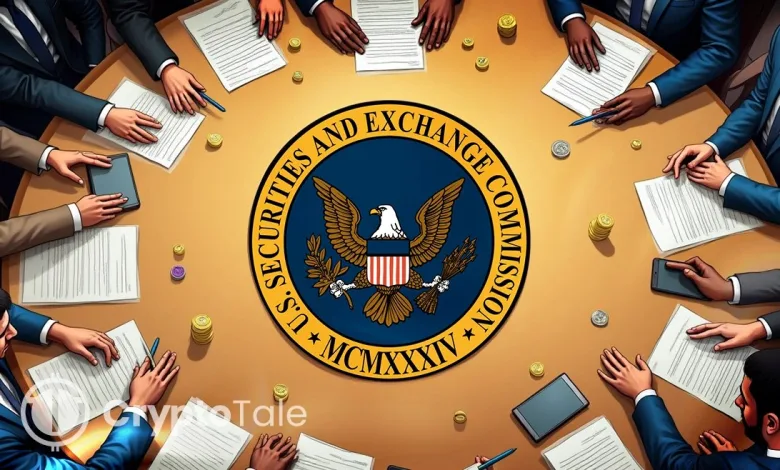SEC Permits State Trusts to Serve as Cryptocurrency Custodians

- The SEC confirms that state trust firms are permitted to hold cryptocurrency assets.
- When picking custodians, advisers must make sure the interests of their clients are met.
- Under the new clarity, BitGo, Coinbase, and Ripple could all strengthen custody.
In a notable shift, the U.S. Securities and Exchange Commission has issued a no-action letter allowing investment advisers to use state-chartered trust companies as qualified custodians for cryptocurrencies. The letter, dated Tuesday, clarifies that advisers and regulated funds under the Investment Advisers Act of 1940 may treat these entities as “banks” for handling crypto assets and related cash equivalents. The guidance applies to the placement and safekeeping of assets, including Bitcoin, Ethereum, and tokenized securities, provided compliance conditions are met.
Expanded Custody Options
The response came after law firm Simpson Thacher & Bartlett requested assurance that registered institutions, such as venture capital firms, would not face enforcement action for holding cryptocurrencies with state-chartered trusts. The Division of Investment Management confirmed that these entities may serve as custodians, provided they maintain protective procedures.
The letter requires that advisers perform due diligence and confirm that using state trust companies is in the best interests of clients. Safeguards must also include the segregation of client assets, policies for the storage of cryptocurrencies, and written agreements that prevent unauthorized use.
Bloomberg Intelligence analyst James Seyffart welcomed the decision, calling it “a textbook example of more clarity for the digital asset space” in a post on X. He noted that the industry had long requested such assurances.
Regulatory Voices and Industry Response
SEC Commissioner Hester Peirce stated that the no-action letter ends the “guessing game” for advisers and funds choosing custodians for crypto assets. She explained that the guidance benefits clients and fund shareholders by confirming a consistent framework.
Peirce also suggested that the letter could open discussions on modernizing custody requirements for advisers and funds through principles-based rules, covering both digital assets and tokenized securities.
Brian Daly, Director of the Division of Investment Management, told journalist Eleanor Terrett that clarity was essential because state trust companies had not been universally recognized as eligible custodians. He added that the staff letter could inform future rulemaking.
Related: US SEC Considers Proposal to Allow Stocks to Trade on Blockchain
Political and Market Implications
The no-action letter is the second issued by the SEC in the same week, reflecting what observers view as a lighter enforcement approach during the Trump administration. Officials have repeatedly stated their intention to ease oversight to encourage crypto growth in the United States.
Wyoming Senator Cynthia Lummis expressed support, noting her state had recognized trust companies as custodians in 2020, a move previously rejected by the SEC. She said the letter showed progress in aligning federal and state approaches to digital asset custody.
Pseudonymous trader Marty Party said on X that the decision could create “many more crypto custodians,” describing it as positive for adoption. Market participants pointed to firms like Ripple, Coinbase, and BitGo, which operate trust structures in New York and South Dakota. These companies may now strengthen their institutional custody services with reduced regulatory uncertainty.
This development follows the implementation of restrictions on banks and financial institutions under “Operation Choke Point 2.0,” a program by the Federal Reserve and Treasury that limited partnerships with cryptocurrencies. The SEC’s shift provides advisers and funds a clearer path to manage client digital assets within regulated structures. The question now is whether the SEC will transition from staff guidance to permanent rulemaking, thereby establishing a formal framework for crypto asset custody.




